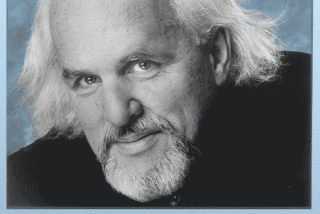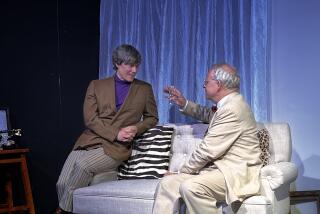Thomas Babe; Wrote Plays Based on History
- Share via
Thomas Babe, a playwright who was best known for plays that cast a critical eye on American history, died Dec. 6 in Stamford, Conn., from lung cancer. He was 59.
In the late 1970s and early 1980s, Babe was a resident playwright at the New York Shakespeare Festival, the innovative off-Broadway institution led by the powerful producer Joseph Papp.
Among Babe’s plays from that era were “Kid Champion,” about a has-been rock star played by Christopher Walken; “Rebel Women,” with David Dukes as the Civil War’s Gen. William Tecumseh Sherman; “A Prayer for My Daughter,” examining a police interrogation; and “Fathers and Sons,” in which Richard Chamberlain starred as Wild Bill Hickok and Dixie Carter as Calamity Jane.
“Fathers and Sons” was the first of Babe’s plays to reach the Los Angeles area: It was staged in a 1980 production at the Solari Theater (now the Canon) in Beverly Hills, again with Chamberlain and Carter.
In 1985, the Mark Taper Forum presented Babe’s “Planet Fires” as a play in progress on a double bill with Neal Bell’s “Sleeping Dogs.” Besides being professional colleagues, Babe and Bell lived together for more than two decades.
Two of Babe’s later plays had their premieres in Southern California. His “Demon Wine,” about a jobless blue collar man who is drawn into the underworld, was introduced at Los Angeles Theatre Center in 1987, with a cast that included Bill Pullman, Tom Waits, Philip Baker Hall, Carol Kane and Bud Cort.
Known for His ‘Sense of Theater’
Sylvie Drake, then a Times drama critic, said the play “eludes classification--perhaps the surest manifestation of its success. It can be seen as a comic satire or a satirical tragedy, with much the same results.”
In 1993, South Coast Repertory in Costa Mesa introduced Babe’s “Great Day in the Morning,” a sprawling piece about the Gilded Age of the 1880s that drew a parallel with boom times in the 1980s.
David Emmes, who directed “Great Day in the Morning,” recalled Babe as “a man of great intelligence and warmth, a keen imagination and a tremendous sense of theater.”
In a Times interview in 1993, Babe said that “someone once wrote that it was too bad that I’ve never found my voice. That is the stupidest thing I ever read, because every situation I write about requires a different configuration of language, with different people talking in different ways.”
He attributed his ability to vary his voice to his Yale Law School training: “You learn to argue every side of a case, and you do that best in the theater if you never bring on a character you don’t care for.”
In addition to Bell, Babe is survived by a daughter from an early marriage, his mother and two sisters.
More to Read
The biggest entertainment stories
Get our big stories about Hollywood, film, television, music, arts, culture and more right in your inbox as soon as they publish.
You may occasionally receive promotional content from the Los Angeles Times.










